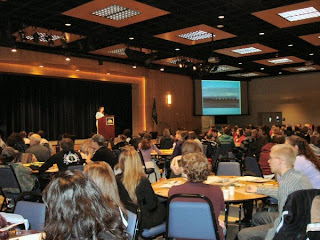The CRFPO quickly organized: bikes were tuned up, routes were planned, and equipment needs such as bike pumps and extra tire tubes were discussed. Those participating in the challenge decided to meet at various points along the route and ride to the office together.
The weather leading up to Friday's big commute was promising- partly cloudy, low 60's, and just a few mild rain showers in the afternoon. Friday morning, however, was a different story. Rain, temps in the upper 40's and a blustery wind. I was pretty sure those who had committed to doing the ride earlier in the week would change their minds once they saw the forecast . I mean even a seasoned commuter would scoff at such conditions!
Despite the wet weather, the CRFPO had 11 people that commuted by bike into work. Our office won the challenge ...by a landslide. The total participation rate per office was: USFWS: 21%, USGS 12% and WACOM 7.7%. We also won for the following categories: total round trip mileage commuted by an office (CRFPO 255 miles, WACOM 153 miles), and total round trip mileage commuted by one person (CRFPO 42 miles, WACOM 31.2 miles).

To quote one of our competitors from WACOM "I caught up with 9 of FWS's riders this morning on my way in, and I was impressed that they had all ridden across the 205 bridge together. Not only that, but they wanted to make the group ride a monthly event!"
The following week we had a community, lunchtime potluck with our competitors, and we collectively celebrated everyone's participation in the challenge. The potluck also provided a forum for discussing how we can reduce our carbon footprint in an office environment.
To learn more about the Federal Green Challenge and how you can help reduce carbon emissions check out the following link:
http://www.epa.gov/climatechange/wycd/road.html



